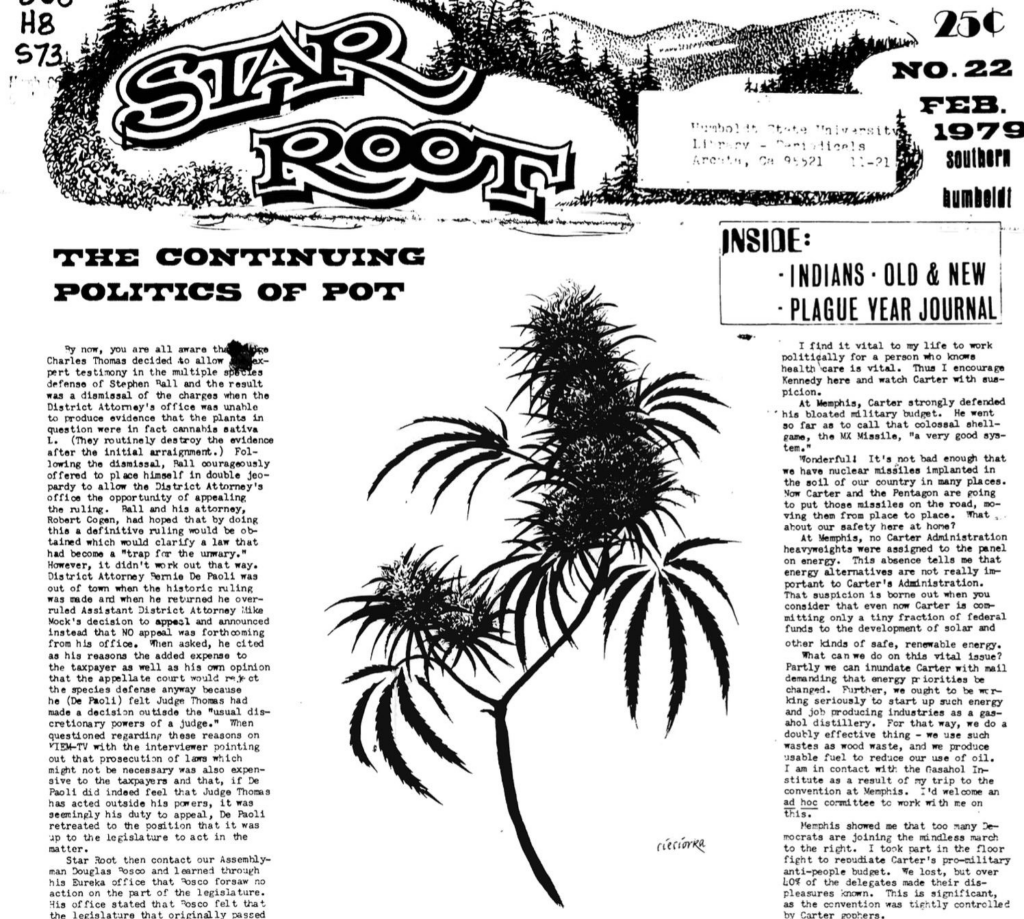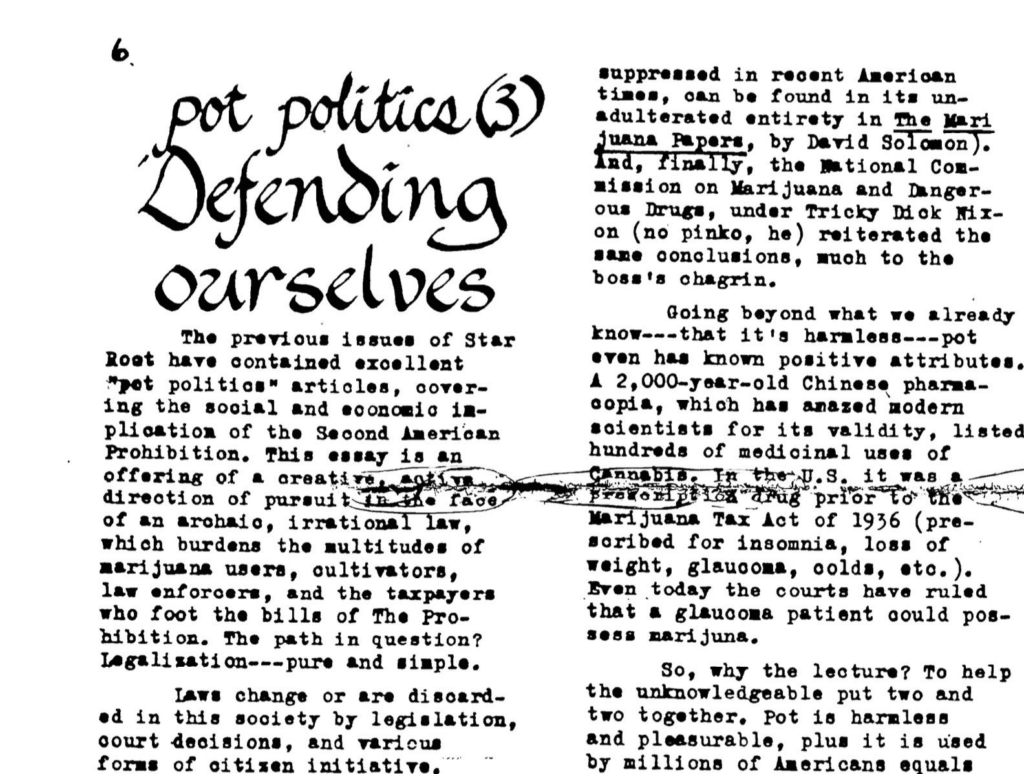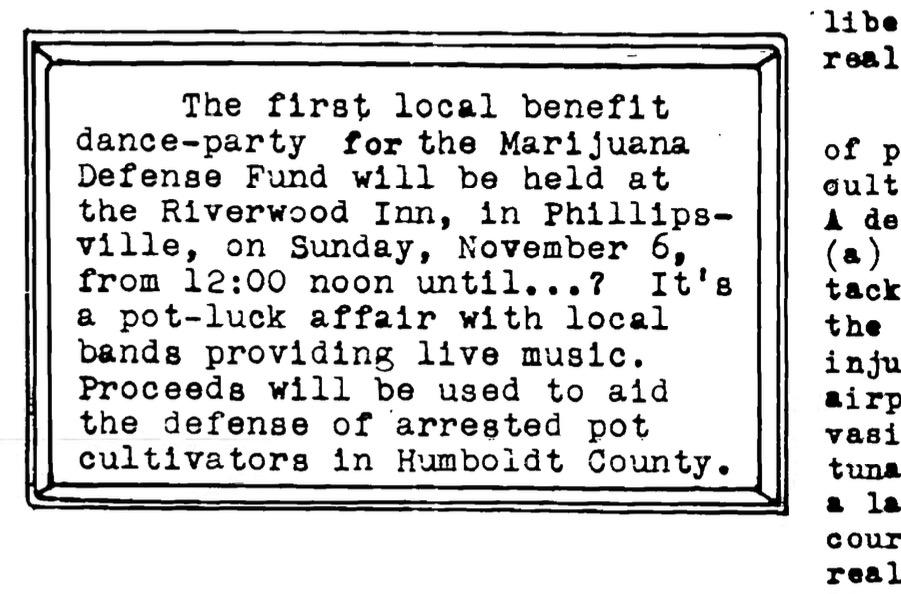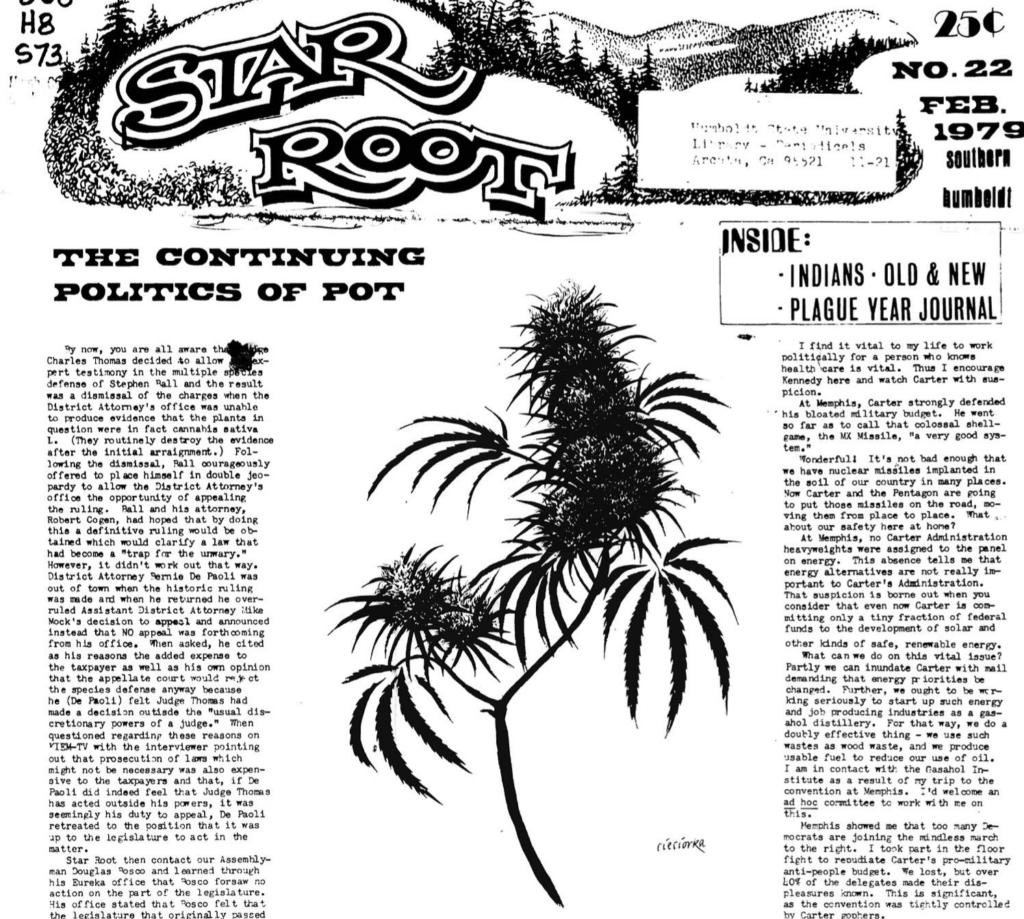Rural Reverb'
A weekly column in Redheaded Blackbelt
#1 Local Weed Debate from the 70s
Growing illegal cannabis was for some a “duty and privilege,” wrote renowned forest activist Ruthanne Cecil in a 1977 article that appeared in Southern Humboldt’s hippie-founded newspaper Star Root. She described police cannabis confiscation as theft and illegal growing as “justified” for she argued that “those citizens who knowingly break the law on a regular basis by either smoking or growing marijuana do so [because those laws] may very well deserve to be broken.” She compared breaking cannabis laws to acts of civil disobedience necessary to “bring about changes which are good for society as a whole.”
Cecil’s article titled, “One View from the Hills: Legalized Ripoff” appeared in the September issue Star Root, 1977, the year it launched. By October, editors offered a regular Politics of Pot column, usually a short essay featuring local back-to-the-landers arguing both for and against the then-burgeoning weed economy.
“Defending Ourselves,” by Ted Kogon, appeared as the third Politics of Pot installment, in November 1977. Kogon, who died last year, was an activist and journalist who founded the first hippie grocery store and deli, Evergreen Health Foods. In it, Kogon railed against the “Second Prohibition” and promoted an event to raise money for growers’ legal defense.
Not everyone agreed the new weed economy was such a good idea. Ron Davidson, in the August 1978 Politics of Pot essay, “The Spirit of the Land,” wrote:
“We residents in the Garberville area (I’ve been a landowner for three years), so-called hippies and rednecks, have become profoundly aware of the unforeseen problems of pot-cultivation in the last few years, especially since the area’s notoriety has increased.”
Davidson wrote that the blame for Humboldt’s notoriety lay as much in local pride, advertising “Humboldt Homegrown” on bumper stickers as “our one renewable resource,” as with outside media.
He wrote:
“Who could foresee that homegrown tops would leap in value to such proportions that we back-to-nature earthfolk(sic) would have to examine our real (in many cases subconscious) materialistic values with such a subtle but ever-increasingly large magnifying glass. (I know of a few people who find it easier to pay for their firewood with pot money rather than go out and cut their own).”
He lists the appearance of locked gates, rip-offs, violence and busts as having put “us ALL in a very precarious situation and is one reason why I’ve stopped growing pot myself. (Love thy neighbor)”
Davidson concludes:
“Using the land to grow a product that easily converts into large amounts of money, whether that product be redwoods or grass, impairs the spirit of the land. […] It has been said that if you speak the truth, the truth will make you free. I feel free. How about you?”
In a full-throated polemic for illegal cannabis as a means to liberate women from men and all shackles of low-paid labor, the author and anthropologist Jentri Anders, under the byline, “Ann I. Elation,” joined the debate with “Growing Marijuana & Social Change,” October 1978 Politics of Pot column.
Elations/Anders, enters the ring swinging:
“As long as we have decided to discuss the social and ethical ramifications of marijuana growing openly, I have some thoughts to contribute which I feel the intelligent decision-maker may find useful. Gurus may not. I will leave them to their mountaintops with my blessing. My dharma appears to be action on the physical plane.”
Seeing into our future, she wrote:
I see marijuana as a step in the right direction, in spite of the random bad vibes occurring behind its illegality. When the shit hits the fan and the whole industrial complex falls (perhaps after a period of totalitarian government, watch for signs), marijuana will be a useless crop. We’ll need to have our mixed agriculture and animal trip with individual wind, water and solar systems, local healers (yay, Redwood Rural Health), food cooperation systems (Let’s hear it for Ruby Valley Warehouse) together. Meanwhile, we can keep the experiment going, keep ourselves individually and collectively on our feet, with funds derived from a harmless, ecologically sound agricultural produce which – please note – is available on an egalitarian basis. (more on this later).
In addition to enabling us to get funds for solar energy systems and wind systems and to help us survive while we learn how to balance our farms and gardens and how to live in a more direct relationship with nature, marijuana is a first step in the right economic direction because:
1) It may replace welfare […]; 2) it is available to persons who have and have had no other source of funds […] 3) it encourages persons who have not been trained to grow, to grow their own – everything.
A month later, Star Root published the Politics of Pot doubleheader, “Pot for People Not for Profit” signed by Bruce McIntosh and “Police Looting and Vandalism” signed by Ripped Off.
McIntosh’s essay responds directly to Ann I. Elation’s claims for cannabis’s liberatory potential, writing, “The only effects I have seen from dope growing in this community have been negative.” The essay ends declaring:
“What is needed is legalization of marijuana. Then people can grow their own and not have to pay inflated prices. Let’s stop supporting the rich habits of people in the city and start thinking of our own community. Pot for people, not for profit.”
Ripped Off described a police rampage in October involving a fifty-man machine-gun armed task force. He takes on the “big v. small” grower issue:
So all you people who have the attitude of being scared rabbits hiding in their separate dens trying to ignore the fact that all the other scared rabbits have gardens too and thinking that someone else who grows more than you will be the next victim and not you better think twice about the Oct. 12 raid and maybe not be so quick to blame all growers misfortunes on the [big] growers by saying ‘Oh, they were growing too much, they deserve it. We’re cool, we got away with it.’ A lot of people who thought they were cool and had very small gardens were ripped-off for the small amount they had and the same thing could happen in your neighborhood too. […] The only way to protect yourselves in unison, as a whole united group of concerned, proud residents for the purpose of protecting our God-given rights and not hiding in their territory playing the odds and hoping their number won’t come up. This kind of attitude only helps the cops do their dirty work because people are too busy feeling scared and guilty to do the slightest thing about it. If everyone who supports the cause would join in unison and start confronting these cops on their raids it would turn this state upside down because they’d have to use the Army to control it and if that happens they’ll have to give up their stupid, outdated laws.”
The author and journalist Mary Anderson, one of Star Roots founders, and later sole publisher of Star Route, signed the front-page February 1979 Politics of Pot essay, “The Continuing Politics of Pot.” Less an opinion essay than straight reporting, it covered a precedent-setting innovation in cannabis criminal defense, the so-called Species Defense that cannabis defense attorney Robert Cogen used to have his client’s illegal possession and cultivation charges dismissed.






